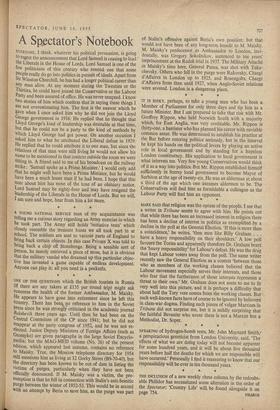ONE OF THE QUESTIONS which the British tourists in Russia
(if there are any takers at £135 per round trip) might ask concerns the health of the former Ambassador, M. Maisky. He appears to have gone into retirement since he left this country. There has been, no reference to him in the Soviet Press since he was strongly criticised in the academic journal Bolshevik three years ago. Until then he had been on the Central Committee of the CP since 1941; but he did not reappear at the party congress of 1952, and he was not re- elected. Junior Deputy Ministers of Foreign Affairs (such as Gromyko) are given paragraphs in the large Soviet Encyclo- Pdia; but the MAG-MED volume (No. 26) of the present edition, which appeared last autumn, contains no reference to Maisky. True, the Moscow telephone directory for 1954 Still mentions him as living at 12 Gorky Street (89-70-40), but the directory has been known to be out of date in listing the victims of purges, particularly when they have not been officially denounced. If M. Maisky was a victim, the pre- sumption is that he fell in connection with Stalin's anti-Semitic Purge between the winter of 1952-53. This would be in accord With an attempt by Beria to save him, as the purge was part of Stalin's offensive against Beria's own position; but that would not have been of any long-term benefit to M. Maisky. M. Maisky's predecessor as Ambassador to London, inci- • dentally, was Gregory Sokolnikov, sentenced to ten years' imprisonment at the Radek trial in 1937. The Military Attaché in Maisky's time here, General Putna, was shot with Tuka- chevsky. Others who fell in the purge were Rakovsky, Chargé d'Affaires in London up to 1925, and Rosengolts, Chargé d'Affaires from then until 1927, when Anglo-Soviet relations were severed. London is a dangerous place.










































 Previous page
Previous page